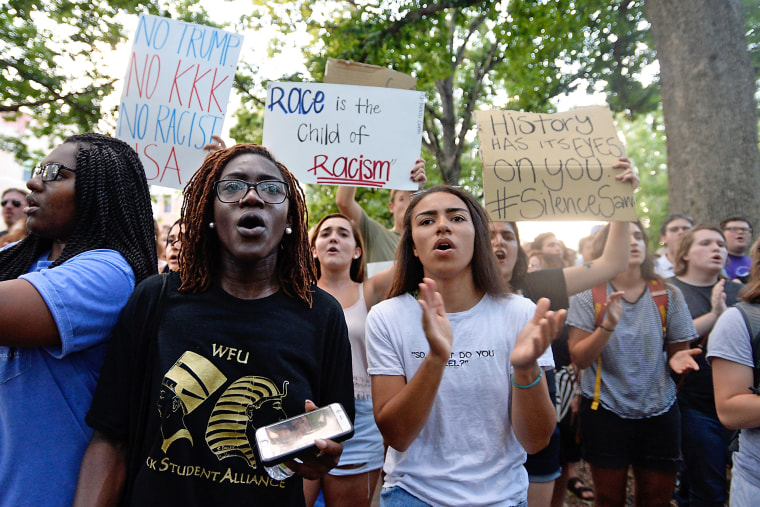In a naked power move, the University of North Carolina at Chapel Hill’s politically appointed (and leaning conservative) board of trustees refused last week to extend tenure to Nikole Hannah-Jones, the Black journalist who created The New York Times’ “1619 Project,” an ambitious series rethinking some of the major founding myths of the U.S. Instead of accepting the prestigious Knight Foundation-endowed chair in race and investigative journalism with tenure — as the faculty recommended — Hannah-Jones, a UNC alum, was offered (and accepted) a fixed five-year contract with future tenure consideration.
The politics surrounding Hannah-Jones’ position at one of the top journalism programs in the country are at once shocking and predictable.
The politics surrounding Hannah-Jones’ position at one of the top journalism programs in the country are at once shocking and predictable. The University of North Carolina at Chapel Hill is the flagship public university in a political battleground state. And while Hannah-Jones has been widely praised for spearheading a national conversation about the centrality of slavery in society, she’s also been targeted by right-wingers, including former President Donald Trump, as the mastermind behind an unpatriotic revision of American history.
But history and partisan politics aside, we should not be surprised that Hannah-Jones’ tenure process has been anything but smooth. Tenure is meant to protect academic freedom, a key principle that operates similarly to freedom of speech (without the constitutional protections). Tenure also provides a degree of job security rare in the United States. Universities and academic departments are required to spell out their tenure expectations and the procedures governing the process. Yet, the process still feels mysterious and the outcomes, either in favor or opposed, uncertain.
Tenure is granted after a close reading of the candidate’s body of work and teaching record, evaluated internally and sometimes externally before department faculty and university committees vote. University presidents, trustees and, in cases like at UNC, university boards of governors also weigh in. As with hiring in other professions, at any step along the way you’ll find biases of all sorts, maneuvering, ax grinding, exceptions and favors, and other backdoor diplomacy.
The opacity is particularly thick for faculty of color, men and women alike, who are less likely than their white counterparts to be hired in the first place, let alone tenured. The UNC board of trustees cited Hannah-Jones’ lack of a “traditional academic-type” background in its rejection — although many tenured and tenure-track university positions, from business schools to the arts and humanities, do not require traditional credentials like doctorate degrees. Besides, the Knight Foundation endowment program is designed specifically to attract leading reporters, not communications scholars.
At a time when much of the GOP appears in deep denial, or at least is pretending to be, over inconvenient realities like election losses and the slaveholding of the Founding Fathers, it is unsurprising to witness conservatives pressuring higher education institutions to join the charade.
It is also unsurprising that a Black woman’s stellar record is being treated to such an intense level of scrutiny. Despite a plethora of diversity initiatives and institutional promises to hire and promote faculty from historically underrepresented groups, the top-ranked universities and colleges remain overwhelmingly white. This is a higher education version of the same “curated integration” — a process that allows for a sprinkling of people of color as evidence of diversity — that Hannah-Hones exposed in her award-winning writing on school segregation.
Such calls for diversity grew louder in 2020 after the Black Lives Matter protests raged in the wake of George Floyd’s murder. Still, there has been little growth in the number of faculty of color on campuses in recent years; indeed, less growth than the number of graduate students of color earning their doctorate degrees. And where there has been growth, new faculty of color say they have experienced other obstacles, such as greater student advising demands, a higher burden of proof when legitimizing their work and teaching approaches that can be treated as “too narrow” — especially if they work on racism and inequality, intersectionality, or anti-Black racial violence. Black students and faculty navigate their campuses, work and studies with the added stress of everyday microaggressions and more shocking harassment by peers, administrators and campus security. These added stresses are, of course, not officially recognized or figured into performance.
All of this was on my mind when I was up for tenure a few years ago. I confided in a white colleague that I was nervous about the decision. She scoffed and reminded me that I had “done what I was supposed to do” as far as publishing and teaching. I reminded her that I’m Black and do not expect social institutions to be fair — whether I behave as prescribed or not.
Even when the requirements have been not just met but exceeded, we wonder if what we write about and teach will be held against us. Clearly, this is not an unfounded concern. Indeed, there is a reason we must find ways to recognize and reward ourselves.
The Knight Foundation’s president, Alberto Ibargüen, has urged UNC to reconsider its decision and noted the foundation’s enthusiasm for Hannah-Jones’ appointment. Meanwhile, Hannah-Jones has yet to offer a detailed reaction to the melee. But she tweeted that “this fight is bigger than me, and I’ll try my best not to let you down.”
There are some classic elements of the culture war at play here — it’s loud and political with far-reaching implications. But we must also recognize the quieter undertones: the way exclusion and racial privilege is built into the fabric of our social institutions, even the ones that wave the banner of freedom and equality.


